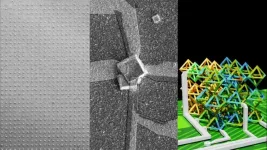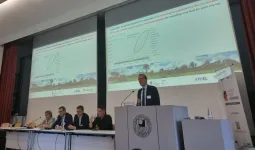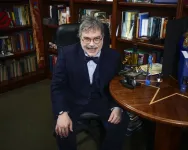(Press-News.org) PHILADELPHIA – The members of the American Association for Cancer Research (AACR) have elected Keith T. Flaherty, MD, Fellow of the AACR Academy, as the AACR President-Elect for 2025-2026. Flaherty will become President-Elect on Monday, April 28, during the AACR’s Annual Business Meeting of Members at the AACR Annual Meeting 2025 in Chicago, Illinois and will assume the Presidency in April 2026 at the AACR Annual Meeting in San Diego, California.
Flaherty is director of clinical cancer research and the Richard Saltonstall Endowed Chair in Oncology at Mass General Cancer Center, a founding member of Mass General Brigham. He is also a professor of medicine at Harvard Medical School and an associate member of the Broad Institute of MIT and Harvard.
Flaherty’s career has focused on understanding the molecular and clinical consequences of inhibiting oncogenic pathways in melanoma while establishing therapeutic approaches and constructing rational combinatorial therapies for the treatment of this disease. He has pioneered the development of targeted therapies matched to the genetic characteristics of a patient's tumor and led early clinical trials testing vemurafenib and other therapeutic agents for the treatment of melanoma. Through his work, Flaherty has translated discoveries about the BRAF V600E somatic mutation in cancer into effective therapies, including the FDA-approved combination targeted therapy regimens for melanoma.
As the AACR’s next President-Elect, Flaherty will work with the Officers and Directors of the AACR Board and the AACR membership at large, which includes more than 58,000 members in 141 countries and territories, to further the AACR’s mission to prevent and cure all cancers through research, education, communication, collaboration, science policy and advocacy, and funding for cancer research.
“It is the singular greatest honor of my career to be elected to serve the AACR and its membership in this capacity,” said Flaherty. “During my tenure, I hope to redouble our efforts to bridge cutting-edge discovery science with clinical translation by virtue of career development and mentorship of the next generation of translational investigators, particularly those aiming to address the needs of underserved populations.”
“Dr. Flaherty’s remarkable work in developing targeted therapies for the treatment of melanoma has had an incredible impact on the field,” said Margaret Foti, PhD, MD (hc), chief executive officer of the AACR. “Additionally, he is a dedicated and supportive mentor to the next generation of cancer investigators. We are truly thankful for his exceptional years of service and dedication to the AACR. The organization and its global membership will thrive under his sage leadership. We heartily congratulate Dr. Flaherty on being elected as the AACR’s 2025-2026 President-Elect and look forward to working with him in the years to come.”
Flaherty has been a member of the AACR since 2001 and was elected as a Fellow of the AACR Academy in 2023. He served with distinction on the AACR’s Board of Directors from 2019 to 2022. Flaherty provides important guidance as a current member of the Fellows of the AACR Academy Nominating Committee (2024-present), the AACR Clinical Trials Advisory Council (2023-present), the AACR Exploratory IND/Phase 0 Clinical Trials Task Force (2021-present), and the AACR Project GENIE External Advisory Board (2015-present). He is a former member of the AACR COVID-19 and Cancer Task Force (2020-2022), the AACR Publications Committee (2014-2017), and the AACR NextGen Grants for Transformative Cancer Research Review Committee (2015).
Flaherty has played a critical role in shaping the AACR Annual Meetings by serving as chair (2023-2024), vice chair (2020-2021), and cochair (2012-2013, 2010) of the Annual Meeting Program Committee. He was a member of the Annual Meeting Clinical Trials Committee (2018-2020, 2016-2018, 2012-2013) and chair of the Clinical Trials and Clinical Pharmacology Section of the Annual Meeting Program Committee (2013). He has also helped to guide other AACR scientific conferences and workshops by serving as a member of the AACR Virtual Conference: COVID-19 and Cancer Program Committee (2020), a faculty member of the AACR Clinical Trial Design Part 1: Clinical Trial Design for Targeted Therapies Workshop (2018), and chair of the AACR Special Conference on Translational Cancer Medicine (2010).
In addition, Flaherty previously served as the editor-in-chief (2016-2025) and senior editor (2010-2016) of the AACR journal Clinical Cancer Research. He has also served as scientific editor for the AACR journal Cancer Discovery (2010-2017).
Flaherty has been honored with numerous awards throughout his career, most notably the OncLive Giants of Cancer Care Award for Melanoma (2020), the Society for Melanoma Research Lifetime Achievement Award (2019), the National Cancer Institute Michaele C. Christian Oncology Development Lectureship and Award (2015), the Mass General Cancer Center Harrison Clinical Research Award (2013), and the Peter Fink Memorial Lectureship (2013).
Flaherty earned his undergraduate degree in neurobiology at Yale University and his medical degree at Johns Hopkins University.
Newly Elected AACR Treasurer and Members of the AACR Board of Directors
The members of the AACR have also elected a Treasurer and five individuals to serve on the AACR Board of Directors for the 2025-2028 term:
AACR Treasurer
Michael A. Caligiuri, MD, FAACR, is a professor in the Department of Hematology and Hematopoietic Cell Transplantation at the City of Hope National Medical Center and Beckman Research Institute. Caligiuri served as Treasurer-Elect from 2022 to 2025 and President of the AACR from 2017 to 2018. [Photo]
AACR Board of Directors
Johann S. de Bono, MD, PhD, is the Regius Professor of Cancer Research, professor in experimental cancer medicine, and honorary consultant medical oncologist at The Institute of Cancer Research, London and The Royal Marsden NHS Foundation Trust, where he is also the director of the Drug Development Unit and head of the Prostate Cancer Targeted Therapy Group. [Photo]
Mikala Egeblad, PhD, is a Bloomberg Distinguished Professor of Tumor Microenvironment and a member of the Convergence Institute at Johns Hopkins University. She is also associate director of the Giovanis Institute for Translational Cell Biology and coleader of the Cancer Invasion and Metastasis Program at the Sidney Kimmel Comprehensive Cancer Center. [Photo]
Crystal L. Mackall, MD, FAACR, is the Ernest and Amelia Gallo Family Professor at Stanford University and founding director of the Stanford Center for Cancer Cell Therapy. [Photo]
Charles W.M. Roberts, MD, PhD, is the director of the St. Jude Comprehensive Cancer Center and executive vice president of St. Jude Children’s Research Hospital. [Photo]
Timothy A. Yap, MBBS, PhD, is the Ransom Horne, Jr. Endowed Professor for Cancer Research in the Department of Investigational Cancer Therapeutics (Phase I Program) at The University of Texas MD Anderson Cancer Center, where he is also vice president and head of clinical development in the Therapeutics Discovery Division and associate director of translational research in the Khalifa Institute for Personalized Cancer Therapy. [Photo]
END
Keith T. Flaherty, MD, FAACR, elected as American Association for Cancer Research President-Elect for 2025-2026
New Treasurer and five new Board of Directors members elected
2025-03-28
ELSE PRESS RELEASES FROM THIS DATE:
Brownie points for ChatGPT’s food analysis skills
2025-03-28
URBANA, Ill. — AI is changing the way we work, create, and share information — but brownies? A new study from the University of Illinois Urbana-Champaign explores how ChatGPT can be used in the sensory evaluation of foods, specifically brownies. The study offers insights that could streamline development of new products, and possibly enhance recipes moving forward.
But, why use AI for brownie tasting? Most people would gladly line up to sample chocolatey treats. However, in the food industry, sensory evaluation is an essential yet rigorous and costly process. Companies ...
The Giants Foundation provide 12 schools with CPR resources to improve cardiac emergency outcomes
2025-03-28
NEW JERSEY, March 27, 2025 — The American Heart Association and The Giants Foundation, the nonprofit organization of the New York Giants, gathered representatives from 12 local schools for cardiopulmonary resuscitation (CPR) and automated external defibrillator (AED) training on March 20 at MetLife Stadium. According to American Heart Association data, nearly 9 out of 10 people who experience cardiac arrest outside of a hospital die, in part because they do not receive immediate CPR more than half of the time. CPR, especially if performed immediately, can double or triple a person’s chance of survival.
“Early recognition and action in a cardiac emergency ...
Why scientists are worried about weasels
2025-03-28
When monitoring the health of mammal populations, scientists often use camera traps to observe the animals in their habitats. But weasels are so sneaky they’re rarely caught on camera – leaving scientists with questions about this population of predators.
“We’re a little worried about the weasels,” says Roland Kays, a research professor at North Carolina State University and scientist at the N.C. Museum of Natural Sciences. “We don’t see them very often, but it’s ...
American College of Cardiology recognizes 21 Distinguished Award recipients
2025-03-28
The American College of Cardiology is proud to announce the recipients of the 2025 Distinguished Awards. The twenty-one recipients have made remarkable contributions to the cardiovascular professional, helping the ACC in its mission to transform cardiovascular care and improve heart health for all.
Awardees will be recognized during Convocation at the American College of Cardiology’s Annual Scientific Session (ACC.25) taking place March 29 – 31, 2025, in Chicago.
The 2025 Distinguished Award winners are:
2025 Bernadine Healy Leadership in Women’s Cardiovascular Disease
Malissa J. Wood, MD, FACC
2025 Distinguished Cardiovascular ...
American College of Cardiology recognizes three recipients of the Hani Najm Global Scholar Award Observership Program
2025-03-28
The American College of Cardiology will honor three early career cardiologists with the Hani Najm Global Scholar Award Observership Program at ACC's Annual Scientific Session (ACC.25), taking place March 29 – 31, 2025, in Chicago.
Established in 2020 at the Saudi Heart Association’s Annual Conference, the Hani Najm Global Award Observership Program encourages and fosters the sharing of knowledge between international cardiology professionals, specifically early career cardiologists in the Middle East and Africa. Through its Observership Program, recipients have the opportunity to ...
DNA helps electronics to leave flatland
2025-03-28
Researchers at Columbia Engineering have for the first time used DNA to help create 3D electronically operational devices with nanometer-size features.
"Going from 2D to 3D can dramatically increase the density and computing power of electronics," said corresponding author Oleg Gang, professor of chemical engineering and of applied physics and materials science at Columbia Engineering and leader of the Center for Functional Nanomaterials' Soft and Bio Nanomaterials Group at Brookhaven National Laboratory.
The new manufacturing technique could also contribute to the ongoing effort ...
Studying cardiac cells in space to repair heart damage on Earth
2025-03-28
KENNEDY SPACE CENTER (FL), March 28, 2025 – Heart disease remains the leading cause of death in the United States, accounting for one in five deaths. The inability of damaged heart muscle tissue to regenerate makes heart disease difficult to treat, and end-stage heart failure patients have no choice but to join a long list of people waiting for a heart transplant. Researchers from Emory University are working to provide another option for such patients. To do this, the team took their research to a laboratory unlike any on Earth—the International Space Station (ISSInternational Space Station).
Chunhui ...
Studies evaluate the health effects of bioactive compounds obtained from plants
2025-03-28
Fruits and plant extracts contain bioactive compounds that can help treat or prevent diseases. To characterize and understand their mechanism of action, researchers from universities and research institutions in Brazil and Germany have conducted independent but complementary studies.
Some of the results were presented at a lecture session on the future of food and nutrition research on March 25th during FAPESP Week Germany at the Free University of Berlin.
According to Ulrich Dobrindt, a professor at the University of Munich in Germany, medicinal plants contain different types of phytochemicals (natural ...
Howard University physicist revisits the computational limits of life and Schrödinger’s essential question in the era of quantum computing
2025-03-28
WASHINGTON, DC – (March 28, 2025) More than 80 years ago, Erwin Schrödinger, a theoretical physicist steeped in the philosophy of Schopenhauer and the Upanishads, delivered a series of public lectures at Trinity College, Dublin, which eventually came to be published in 1944 under the title What is Life?
Now, in the 2025 International Year of Quantum Science and Technology, Philip Kurian, a theoretical physicist and founding director of the Quantum Biology Laboratory (QBL) at Howard University in Washington, D.C., has used the laws of quantum mechanics, which Schrödinger postulated, and the QBL’s discovery of cytoskeletal ...
Navigating a US bioscience career despite anticipated cuts in funding for biomedicine
2025-03-28
Many young and midcareer scientists in the U.S. are understandably anxious about potential cuts to government funding and the rise of junk science. Although your future in biomedicine may not be what you originally planned, it might actually become more interesting and filled with new possibilities and opportunities for innovation. Don’t think of this time to hunker down and disappear. Do the opposite with the understanding that you are more powerful and brilliant than you may realize.
In your coverage, please use this URL to provide access to ...
LAST 30 PRESS RELEASES:
New study identifies growth hormone receptor as possible target to improve lung cancer treatment
Routine helps children adjust to school, but harsh parenting may undo benefits
IEEE honors Pitt’s Fang Peng with medal in power engineering
SwRI and the NPSS Consortium release new version of NPSS® software with improved functionality
Study identifies molecular cause of taste loss after COVID
Accounting for soil saturation enhances atmospheric river flood warnings
The research that got sick veterans treatment
Study finds that on-demand wage access boosts savings and financial engagement for low-wage workers
Antarctica has lost 10 times the size of Greater Los Angeles in ice over 30 years
Scared of spiders? The real horror story is a world without them
New study moves nanomedicine one step closer to better and safer drug delivery
Illinois team tests the costs, benefits of agrivoltaics across the Midwest
Highly stable self-rectifying memristor arrays: Enabling reliable neuromorphic computing via multi-state regulation
Composite superionic electrolytes for pressure-less solid-state batteries achieved by continuously perpendicularly aligned 2D pathways
Exploring why some people may prefer alcohol over other rewards
How expectations about artificial sweeteners may affect their taste
Ultrasound AI receives FDA De Novo clearance for delivery date AI technology
Amino acid residue-driven nanoparticle targeting of protein cavities beyond size complementarity
New AI algorithm enables scientific monitoring of "blue tears"
Insufficient sleep among US adolescents across behavioral risk groups
Long COVID and recovery among US adults
Trends in poverty and birth outcomes in the US
Heterogeneity of treatment effects of GLP-1 RAs for weight loss in adults
Within-person association between daily screen use and sleep in youth
Low-dose lithium for mild cognitive impairment
Catheter ablation and oral anticoagulation for secondary stroke prevention in atrial fibrillation
A new theory of brain development
Pilot clinical trial suggests low dose lithium may slow verbal memory decline
Bioprinting muscle that knows how to align its cells just as in the human body
A hair-thin fiber can read the chemistry of a single drop of body fluid
[Press-News.org] Keith T. Flaherty, MD, FAACR, elected as American Association for Cancer Research President-Elect for 2025-2026New Treasurer and five new Board of Directors members elected




